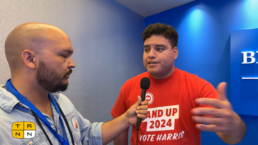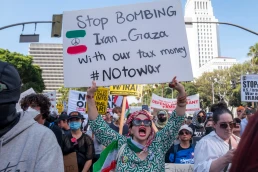After winning a historic strike in the auto industry and being among the first major unions to call for a ceasefire in Gaza, the UAW has emerged as a different kind of political player in the election.
By Maximillian Alvarez, The Real News Network
The United Auto Workers union has become a major political force in the US, and the union’s endorsement of Kamala Harris carries a lot of weight in the lead-up to the general election in November. But that endorsement doesn’t mean the union will stop pushing Democrats for bolder, more worker-friendly economic policy, or for a ceasefire in Gaza and an end to military aid to Israel. At the DNC in Chicago, TRNN Editor-in-Chief Maximillian Alvarez speaks with UAW Region 9A Director Brandon Mancilla about the UAW’s endorsement of Harris, the threat Donald Trump poses to labor, and the critical role that unions are playing in this election.
Videography: Kayla Rivara
Post-Production: Adam Coley

Transcript
Brandon Mancilla: Brandon Mancilla, UAW Region 9A director.
Maximillian Alvarez: Brandon, thank you so much for talking to me, man. So we are here on day three of the DNC. UAW’s got a significant presence here. Organized labor has a significant presence here. I was wondering if you could just tell us a little bit about how the reception has been for you guys, especially after President Shawn Fain’s speech on Monday.
Brandon Mancilla: Yeah, well, definitely on Monday we had a lot of labor leaders speak. Shawn had a prime time spot to talk about our message, our working class agenda moving forward within the Democratic Party, and just making sure that we organize as many workers as possible and get our issues fought for.
I think labor has always had a place within the Democratic Party. But I think right now something is shifting, which is instead of us going to the Democratic Party, the Democratic Party has now realized how important labor actually is to them winning, and also moving forward and recapturing working class votes, because working class people deserve a party that actually fights for them. And that has not been the message that the Democratic Party has relied on for the past 20, 30 years.
And I think the rise of Trump and the MAGA movement says a lot about that. They don’t care about working class people, they don’t fight for working class issues. They definitely do not support the labor movement. But the Democratic Party has not been there, especially with its support of free trade policies such as NAFTA that have led to the immiseration of our industrial towns and so many good union jobs, or jobs with union standards.
So, that’s what we’re fighting for. Our message is pretty clear. We’re fighting for a living wage, we’re fighting for retirement security, we’re fighting for healthcare. And we’re fighting to get our time back. Workers are working two to three jobs, seven days a week, 12-hour days or plus. And that’s just not a life. So, that’s what we’re fighting for, and that’s the path we’re trying to chart with this new labor movement.
Maximillian Alvarez: The UAW quite famously refused to endorse a presidential candidate before the stand-up strike at the Big Three automakers. And in many ways, sending a very clear message that, depending on how you guys respond to the strike, we’re going to make our decision thusly.
What does that say to rank and file members and to workers out there about the change in strategy for how unions in general, but the UAW specifically, is approaching its relationship to the Democratic Party right now?
Brandon Mancilla: Yeah, so essentially what happened last year after Shawn got elected president of our union was that we had to take a conversation forward with President Biden and his administration about the fact that even though he had passed landmark legislation such as CHIPS, IRA, wanted to subsidize a green transition, green energy, infrastructure, et cetera, a lot of this was done with very little consideration of labor and with unions at the table. A lot of the things that were in Build Back Better, for example, were left behind, things that a lot of unions were hoping would make it in the final version of what became the IRA.
And with that, the EV industry, for us. That was the big question. Were we simply going to give Ford and all these companies millions if not billions of dollars in subsidies to just get rid of the UAW? Or were we going to actually fight for these plants to have union jobs and a pathway for our membership to actually keep jobs, to keep jobs in their communities and not get immiserated like they’ve done over the past 20, 30 years of all these plant closures?
So, that’s what the future was. The future was plant closures. And then our strike and finally having Joe Biden move on this issue was crucial. But he only moved because we’ve pushed. We didn’t endorse right away. We forced the conversation that I think he lived up to in the end with our pressure and our strike. And I think that’s how he earned our endorsement.
And going forward, Kamala Harris, same idea. We needed to have a conversation about the future of the party, where the working class program fit in her agenda, and what she was going to do for working people. And so far, that’s what we’ve been able to push with this campaign.
Maximillian Alvarez: It really is a historic moment. Because of course, it was during your guys’ strike last year that President Biden became the first sitting US president to stand on a picket line. So that visually, symbolically, in so many ways, really did signal the changing of the times.
And we are hearing some of that change in the rhetoric over the course of the Democratic National Convention. A lot of folks have mentioned, say, the PRO Act, and the protections that we need for union workers and improving people’s ability to organize in this country. But of course, we also know the PRO Act has not been made a legislative priority for either party. It’s stalled in Congress.
So what conversations are you getting into with members who don’t want Donald Trump to win. Your guys’ shirts all say “Donald Trump’s a scab”, so clearly, your position’s clear there. But we also know there are a lot of members who are still fighting for these other issues that they want to see and they’re not currently getting. How do you navigate that space, pushing the Democratic Party without just giving an endorsement and letting the chips fall where they may?
Brandon Mancilla: So the future of this country is going to depend on two things: protecting jobs, especially union jobs, and also growing the labor movement. Under Trump, we couldn’t protect jobs because he did absolutely nothing about plant closures. When Lordstown closed, he told everyone, don’t sell your house, don’t move. Plant closed, he did absolutely nothing. During the GM strike of 2019, he did absolutely nothing.
The difference with the Biden administration was Stellantis had plans to close Belvidere. Our strike forced them to actually agree to a plant reopening and getting more investment, more product in Belvidere with a battery plant and a PDC. And right now, the struggle is to get Stellantis to keep their promise and actually live up to the commitment. That wasn’t a promise verbally. It was in writing, it’s in the contract. We need to hold them accountable for what they agreed to and get them to live up to their promise.
And with the Biden administration, that pressure is possible. With the Harris campaign, the same thing. We’re going to keep pushing that. Because we want good union jobs in this country, good manufacturing jobs in this country. Not just for the sake of it, but because we know that working people need solid jobs to build communities, to have a life.
And I think what the labor movement needed to grow, we need the PRO Act passed. The PRO Act should be the floor. We should be repealing Taft-Hartley, we should be doing so much more to make it easier for workers who want a union, who want a better life, who want a union contract to be able to get that without so much resistance, and honestly, just employers being able to get away with breaking the law.
Under Trump, we know what he did to the NLRB. He put a bunch of his corporate friends in charge of the Labor Board, and they reversed a bunch of decisions. They came after labor. They did not support labor whatsoever.
So the Democrats aren’t perfect, but we need to absolutely push. And it’s only possible for us to do that with an administration that understands the importance of labor and in both Houses of Congress, in Democratic control. And then we keep doing our thing, we keep organizing. So, that’s the mission right now. If we want Medicare for all, if we want green jobs, green union jobs, we need to have a political voice in this country and need to build power to be able to do that.
Maximillian Alvarez: And I just wanted to ask, because I know so many of our viewers and listeners have asked us this very question. We interviewed International Teamsters Vice President John Palmer days after Sean O’Brien spoke at the RNC last month. Very controversial speech that was also historic. Sean O’Brien first Teamsters president to address the RNC at Donald Trump’s invitation.
The tenor of his speech and the reception of it and the discussion around it is markedly different from what we saw here this week, from the message of Shawn Fain on Monday, from the “Trump is a scab” shirts. What do you see in these two visions for how labor is approaching the electoral process and the pitch that it’s making to the working class out there?
Brandon Mancilla: I think our message is clear. We know what the experience of our members have been under both administrations. And we know how we’re able to move under these two different administrations, and how we can push forward our program and our vision for what the country can look like and what this movement can look like.
And so, we’re not under no illusions about what a Trump Administration would look like for working people, and beyond that, for humanity, for social justice issues, and just keep going down the line.
These are all issues that, no matter how they’re labeled, they’re all working class issues. Because working people have lives and so many different issues that affect them on a day-to-day. If we care about economic justice, racial justice, climate justice, et cetera, we need to have an administration that’s going to listen. And under another Trump Administration, we’re not going to have that.
So, other unions are free to do what they want and talk to whoever they want to talk to. And we know that the membership is not uniform. Members, for whatever reason, are going to have different political parties, backgrounds, candidates. But I think as leaders within the labor movement, it’s our responsibility to put the facts out there and analyze what the reality is.
Under one candidate, this is possible, under another one… And we know their history already. It’s not that we have to make things up. We know what they did. This is going to happen. And we know it’s going to happen because of who they put around them, what their agenda is, Project 2025, all of that stuff. It’s all in writing, it’s all out there, we know what they’re going to do.
Maximillian Alvarez: Last question, I just want to ask you this, because we’ve actually spoken about this at The Real News before. Of course, while the Democratic National Convention is going on, the genocide in Gaza continues. The United States continues to be the primary supporter financially in terms of arms and political support for Israel’s war on Gaza.
And the UAW has also been a real leader in the labor movement, being among the first to call for a ceasefire earlier this year. Also joining other unions and signing on for a call to end arms sales to Israel.
And I just wanted to ask A, about that. For folks who are saying, well, why has the UAW taken a position on this? Why is that important to you guys? And how is that part of your overall message for the working class?
Brandon Mancilla: It matters because it matters to our members. We’ve got many members who are Arab-American, live in Dearborn, Michigan, and have family who have been directly affected, who have been killed because of the war on Gaza. We also have members of the University of California who struck to defend their right for free speech last spring. So, we know the situation on campuses where we also represent thousands of UAW members as well.
And just generally speaking, UAW members, union members, they’re citizens of this country. And if you look at the polls, most people, there’s a democratic majority for a ceasefire. And in order to get that ceasefire at this point, we need an arms embargo because we’re the ones that supply the fire to the state of Israel and its military campaign to carry out these atrocities. So, that’s what we need to see. We need to see concrete action to end this.
And it’s also a political issue for the Democratic Party. We know what the uncommitted movement was able to accomplish, especially in a state like Michigan, over 100,000 voters who came out and voted uncommitted. Those voters still have those same concerns because the war isn’t over. The genocide continues. And in order for us to move forward in this country and build social justice and economic justice in this country, we can’t turn a blind eye to what’s been happening in Gaza over the past 10, 11 months. So, we need to see real change there.
We’ve had conversations. Just like we’re having conversations about working class issues on the economy, on green jobs, and all this other stuff, we’ve also talked to the Harris campaign about the need for a ceasefire and an arms embargo. And to their credit, they’ve listened. They’re saying some of the right things in engaging with these topics. They have spoken to many activists about these questions.
And I was at the panel the other day at the DNC for… That we heard from Palestinian-American and Palestinian activists about the situation in Gaza. But we need action at this point. And I hope we get to hear from a Palestinian-American on the stage this week too.
Recent Posts
Congress, Do Your Job and End This Illegal War of Aggression By The U.S. and Israel
March 2, 2026
Take Action Now Congress must assert its Constitutional authority over matters of war and peace against an out-of-control, rogue president and…
Daniel Ellsberg Speaks to Us as the War on Iran Continues
March 2, 2026
Take Action Now Ellsberg’s voice is back via a compelling new book. “Truth and Consequence,” being published this week, provides readers with his…
The Supreme Court Hears a Line 5 Oil Pipeline Case With High Stakes for Treaty Rights
March 2, 2026
Take Action Now The Straits of Mackinac aren’t just ecologically critical — they’re the center of the Anishinaabe creation story.By…
As Trump Bombs Iran, We Need to Reckon With the American War Machine
March 1, 2026
Take Action Now We cannot afford to slip into despair. We must push back against militarism everywhere, at every turn.By Negin Owliaei ,…




